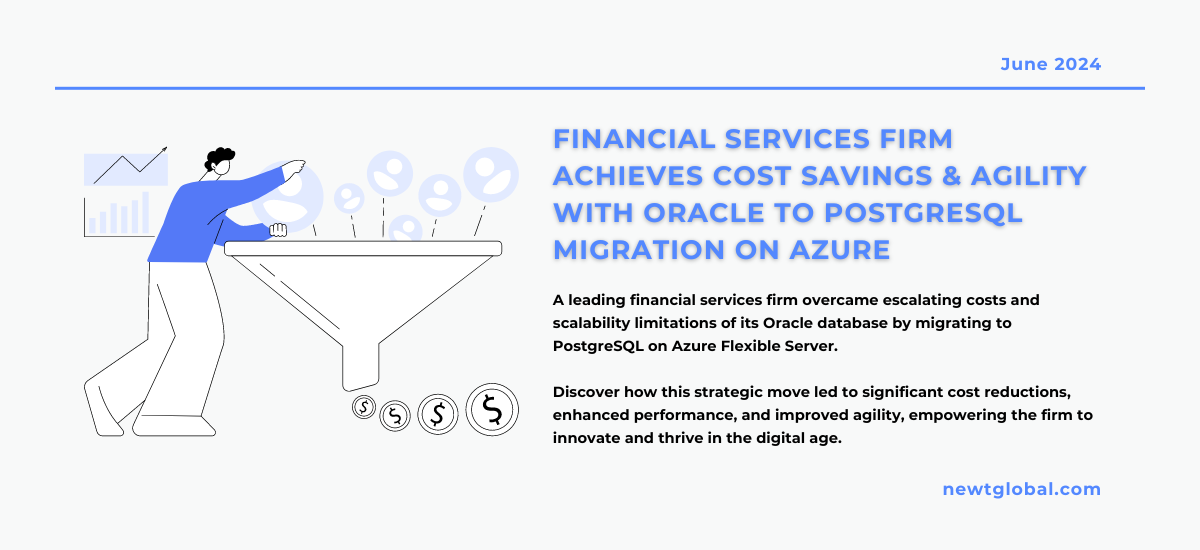
Oracle to PostgreSQL Migration Success Stories with Azure Flexible Server are becoming increasingly common as businesses strive to optimize their operations and embrace more modern, cost-effective solutions. In the dynamic landscape of technology, organizations recognize the need to transition from legacy systems like Oracle databases to more flexible and scalable platforms. PostgreSQL, especially when paired with cloud services like Azure Flexible Server, emerges as a compelling alternative. In this blog, we’ll delve into the success story of a financial services firm that undertook the migration from Oracle to PostgreSQL on Azure Flexible Server, showcasing the benefits and outcomes of this transformation.
Case Study: Financial Services Firm
The financial services firm, a sizeable organization with intricate IT infrastructure, serves a diverse clientele ranging from individual investors to institutional entities. With a broad portfolio of financial products and services, including banking, investments, and insurance, the firm operates in a highly regulated environment where data security, integrity, and availability are paramount.
Founded over three decades ago, the firm has established itself as a trusted provider of financial solutions, renowned for its commitment to innovation, customer service excellence, and regulatory compliance. However, as the financial services landscape evolved and digital transformation became imperative, the firm faced escalating challenges with its legacy Oracle database infrastructure.
Challenges
Despite its established position in the industry, the firm faced several challenges with its existing Oracle database infrastructure:
High Costs: As the firm expanded its operations and diversified its product offerings, the costs associated with Oracle licenses and maintenance continued to escalate. The substantial financial burden imposed by these expenses limited the firm’s ability to invest in innovation and strategic initiatives, hindering its competitive edge in a rapidly evolving market.
Scalability Limitations: The firm’s Oracle infrastructure struggled to keep pace with the exponential growth in data volume and transaction throughput. As customer demands increased and regulatory requirements evolved, the inability to scale effectively led to performance bottlenecks, service disruptions, and compromised user experiences.
Flexibility Issues: The rigid architecture of Oracle databases hindered the firm’s agility in responding to changing business requirements and market dynamics. Customizations and updates to the Oracle setup were cumbersome and time-consuming, impeding the firm’s ability to innovate, launch new products, and seize emerging opportunities.
Solution
To address these challenges and position itself for future growth and success, the financial services firm embarked on a strategic initiative to migrate its critical applications from Oracle to PostgreSQL on Azure Flexible Server. This decision was driven by several compelling factors:
Cost Savings: PostgreSQL’s open-source nature offered a cost-effective alternative to Oracle, eliminating the need for expensive licenses and reducing operational expenses. Azure Flexible Server’s flexible pricing model further optimized costs by allowing the firm to pay only for the resources consumed, aligning expenditures with business needs and priorities.
Scalability and Flexibility: PostgreSQL’s robust scalability and flexibility features, coupled with Azure’s cloud infrastructure, provided the firm with the agility and elasticity needed to support its growing operations and dynamic workloads. With Azure Flexible Server, the firm could seamlessly scale resources up or down in response to changing demands, ensuring optimal performance and resource utilization without over-provisioning or underutilization.
Compatibility and Support: PostgreSQL’s compatibility with existing Oracle applications and tools simplified the migration process, minimizing disruption to business operations and reducing the risk of compatibility issues. Azure Flexible Server’s comprehensive migration tools and support services further facilitated a smooth transition, ensuring minimal downtime and maximum data integrity throughout the migration process.
Results
The migration from Oracle to PostgreSQL on Azure Flexible Server yielded significant benefits for the financial services firm:
Cost Reduction: By eliminating the hefty expenses associated with Oracle licenses and leveraging the cost-effective pricing model of Azure Flexible Server, the firm achieved substantial cost savings, enabling it to redirect resources toward strategic investments in innovation, customer experience enhancement, and market expansion.
Improved Performance and Scalability: PostgreSQL’s superior performance and scalability capabilities, combined with Azure Flexible Server’s dynamic scaling features, resulted in enhanced system responsiveness, reduced latency, and improved throughput, enabling the firm to deliver superior service quality and reliability to its customers.
Enhanced Agility and Innovation: With PostgreSQL and Azure Flexible Server, the firm gained the agility and flexibility needed to innovate rapidly, launch new products and services quickly, and respond promptly to market opportunities and competitive threats. Developers were empowered to experiment, iterate, and deploy changes more efficiently, driving continuous improvement and innovation across the organization.
Enhanced Security and Compliance: PostgreSQL’s robust security features, combined with Azure’s comprehensive compliance certifications and regulatory compliance tools, bolstered the firm’s data protection and regulatory compliance posture, enhancing customer trust and confidence in the firm’s ability to safeguard sensitive financial information and comply with regulatory requirements.
Conclusion
The success story of the financial services firm epitomizes the transformative impact of migrating from Oracle to PostgreSQL on Azure Flexible Server. By overcoming the challenges posed by high costs, scalability limitations, and inflexibility of its legacy Oracle infrastructure, the firm positioned itself for future growth and success in a rapidly evolving and competitive market. This case study underscores the importance of strategic migration initiatives in unlocking efficiency, driving innovation, and achieving sustainable business growth in today’s digital era.
Ready to embark on your cloud migration journey? Visit newtglobal.com to discover how our expert team can guide you through the Oracle to PostgreSQL migration process. Contact us at marketing@newtglobalcorp.com to schedule a consultation and take the first step towards transforming your database infrastructure for the cloud-native era.
